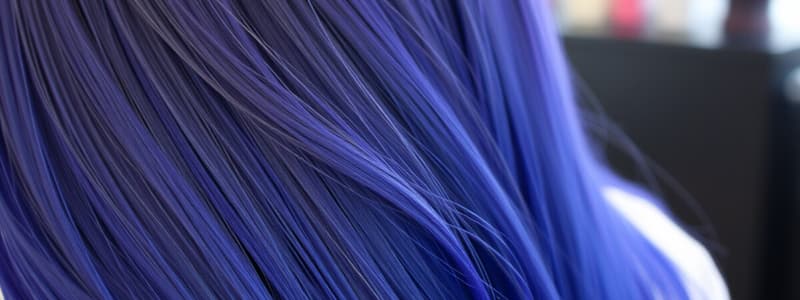Podcast
Questions and Answers
What is the primary characteristic of temporary hair color?
What is the primary characteristic of temporary hair color?
- Uses the largest color molecules that coat the hair (correct)
- Requires a developer to activate the color
- Contains small color molecules that penetrate the hair shaft
- Produces a permanent change in hair color
What type of change does temporary hair color produce in the hair shaft?
What type of change does temporary hair color produce in the hair shaft?
- Organic change
- Chemical change
- Biological change
- Physical change (correct)
What pH range do temporary rinses typically have?
What pH range do temporary rinses typically have?
- 5.0 to 7.0
- 2.0 to 4.5 (correct)
- 1.0 to 2.5
- 7.5 to 9.0
Which type of temporary hair color is used specifically for retouching gray or white hair?
Which type of temporary hair color is used specifically for retouching gray or white hair?
What is the function of color-enhancing shampoos?
What is the function of color-enhancing shampoos?
What must be done if a temporary hair color contains an aniline derivative?
What must be done if a temporary hair color contains an aniline derivative?
Temporary hair colors primarily last until what event?
Temporary hair colors primarily last until what event?
What is the primary reason temporary hair colors do not penetrate beyond the cuticle layer?
What is the primary reason temporary hair colors do not penetrate beyond the cuticle layer?
What type of temporary hair color is primarily used to enhance existing hair color?
What type of temporary hair color is primarily used to enhance existing hair color?
Which of the following is the pH range typically associated with temporary rinses?
Which of the following is the pH range typically associated with temporary rinses?
What is a key feature of color-enhancing shampoos?
What is a key feature of color-enhancing shampoos?
What are crayons used for in the context of hair coloring?
What are crayons used for in the context of hair coloring?
What happens to hair when temporary color is applied?
What happens to hair when temporary color is applied?
Which action is required if a temporary hair color contains an aniline derivative?
Which action is required if a temporary hair color contains an aniline derivative?
Flashcards are hidden until you start studying
Study Notes
Temporary Hair Color Overview
- Temporary hair colors utilize the largest color molecules, preventing penetration beyond the cuticle layer, resulting in only a surface coating.
- The color coating lasts until the next shampoo, making it a short-term solution for altering hair appearance.
- The chemical makeup of temporary color is acidic, inducing a physical change rather than a chemical one in the hair shaft.
- pH range of temporary hair color is between 2.0 to 4.5, enhancing its efficacy and stability.
- When using temporary hair color containing an aniline derivative, a predisposition test is necessary to prevent allergic reactions.
Types of Temporary Hair Colors
-
Color Rinses:
- Highlight existing colors or add new shades to hair.
- Effect persists until the next shampoo.
-
Color-Enhancing Shampoos:
- Combine qualities of color rinses and shampoo.
- Create highlights and impart slight color tones to the hair.
-
Crayons:
- Sticks comprised of soap or synthetic wax, used primarily to color gray or white hair.
- Suitable for use on facial hair such as mustaches, beards, and sideburns.
- Available in several standard colors for diverse applications.
Temporary Hair Color Overview
- Temporary hair colors utilize the largest color molecules, preventing penetration beyond the cuticle layer, resulting in only a surface coating.
- The color coating lasts until the next shampoo, making it a short-term solution for altering hair appearance.
- The chemical makeup of temporary color is acidic, inducing a physical change rather than a chemical one in the hair shaft.
- pH range of temporary hair color is between 2.0 to 4.5, enhancing its efficacy and stability.
- When using temporary hair color containing an aniline derivative, a predisposition test is necessary to prevent allergic reactions.
Types of Temporary Hair Colors
-
Color Rinses:
- Highlight existing colors or add new shades to hair.
- Effect persists until the next shampoo.
-
Color-Enhancing Shampoos:
- Combine qualities of color rinses and shampoo.
- Create highlights and impart slight color tones to the hair.
-
Crayons:
- Sticks comprised of soap or synthetic wax, used primarily to color gray or white hair.
- Suitable for use on facial hair such as mustaches, beards, and sideburns.
- Available in several standard colors for diverse applications.
Studying That Suits You
Use AI to generate personalized quizzes and flashcards to suit your learning preferences.





